2020年春八年级英语下册Unit1What’sthematterSectionB(1a_1d)同步练习(新版)人教新目标版
人教版初二(下)英语unit1 what's the matter知识点讲解与练习

八年级下册英语Unit 1 what’s the matter?词汇篇学生通过本讲学习,能够掌握本单元的重点词汇句型,并在综合能力上有一定的拓展。
1.matter的用法(1)名词:事情,问题What’s the matter? =what’s wrong (with you)? =what’s the trouble怎么啦?出什么事啦?(2)动词:有重大影响,有重要性如:What does it matter?2.疾病的表达法have a cold/a fever/ a toothache/ a stomachache3.take 的固定搭配take one’s temperature/ take breaks/ take risks/take some medicine/take off/ take care of/take away 4.surprise的用法1.做名词:to one’s surprise 使。
惊讶的,出乎。
意料2.做动词:surprise sb使某人吃惊3.做形容词:surprising, surprised的用法5.get的用法get off下车/get on上车/get into陷入,参与6.be used to sth/doing sth 习惯于做某事be used to do sth 被用作去做某事used to do sth 习惯于做某事7.out of的固定搭配look out of 向。
外看/ get out of从。
出来/ run out of用光基础演练1.---What’s wrong ______you?---I fell off the bike and hurt my leg.A. ofB. withC. forD. by2.Tom and Jenny enjoyed _________playing computer games.A. himselfB. herselfC. ourselvesD. themselves3. Sally became interested ___________science and wanted to be a scientist.A. forB. inC. throughD. at4. ---I had a __________.---You’d better go to see a dentist.A. headacheB. feverC. coldD. toothache5. I didn’t _________my temperature, but I knew I had a fever.A. giveB. setC. takeD. show二、根据汉语意思翻译句子。
人教新目标八年级英语下册Unit 1 What's the matter单词速记

Unit 1matter /'mætə(r)/ n. 问题; 事情【台湾词中词】毯子经常出现问题。
[例]What' s the matter?怎么了? 出什么事了?mat[mæt]n.垫子,簇,小地毯,(体育运动用的)厚垫子垫子的问题sore /sɔ:(r)/ adj. 疼痛的; 酸痛的[例]I have a sore back.我后背痛。
【词汇倍增】我的core有点sorecore [kɔː(r)]n. 核心,(水果的)果心,(物体的)中心部分have a cold 感冒[例]I have a cold.我感冒了。
stomachache /'stʌməkeɪk/ n. 胃痛; 腹痛have a stomachache 胃痛[例]I have a stomachache.我胃痛。
【英国字母索源法】stomach(胃)+ache(痛)foot /fʊt/ n. 脚; 足【英国字母索源法】f代表“五官”[例]One of my feet is dirty.我的一只脚脏了。
neck /nek/ n. 颈; 脖子【英国字母索源法】n代表“细长”[例]The neck of the glass is dirty.杯颈脏了。
stomach /'stʌmək/ n. 胃; 腹部[例]what a stomach he has got !他可真是个大腹便便的人!【脑图单词速记】蛇s吐to马ma吃chthroat /θrəʊt/ n. 咽喉; 喉咙 p.1【英国字母索源法】thr代表“三”throat喉咙--通向三处,Third第三 thirteen十三 thirty三十。
[例]She has a very sore throat now.她现在嗓子疼的很厉害。
【词汇倍增】一只goat(山羊)穿件coat(衣服)上了boat(船)掉进moat(城壕)摔断throat (喉咙)fever /'fi:və/ n. 发烧[例] She has a fever.她发烧了。
人教版八年级英语下册Unit 1 What's the matter 词汇短语知识点总结梳理(共1
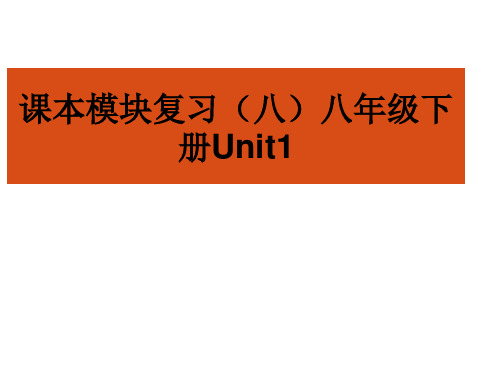
A. what
B. when
C. who
D. how
( D) 2. Please don’t do homework and watch TV_______.
A. from time to time B. all the time
C. at times D. at the same time
课本模块复习(八)八年级下册Unit1
形容词.adj
1.生病的 sick
2.孤单的lonely 3.强壮的strong
4.sore疼痛的
3.trouble问题 4.护士nurse
名词.n
5. rest休息 6.accident意外 7.situation情况 8.decision决定 9.importance重要性
10.death死亡
代词pron
D. provide
课本模块复习(八)八年级下册Unit1
( A) 6. I’ll help ________the city parks on Volunteer Day.
A. clean upB. eat up C. dry up
D. use up
(D) 7. If you like to help the homeless people you can ________food at the food bank.
care for
make see
make sure确定
get up起床
make a face做鬼脸
get
make friends with与…做朋友
make up of构成 make up one's mind下决心
get together聚会 get on with sb与…某人相处 get on上车 get off下车 get down降下
2020年春人教新目标英语八年级下册Unit1单元基础知识讲解

2020年春人教新目标英语八年级下册Unit1 What’s the matter?短语归纳1. play computer games玩电脑游戏2. give advice 提建议3. have a fever 发烧4. have a cold=get a cold=catch a cold=have got a cold患感冒5.have a cough 咳嗽6. have a toothache 牙疼7. have a sore throat患嗓子疼8. too much太多9. drink enough water 喝足够的水10. have a stomachache胃痛11. have a sore back背疼12. lie down and rest 躺下来休息13.wait for sb等待某人14. see a dentist 看牙医15. get an X-ray 拍X光片16. take on e’ s temperature 量体温17. put some medicine on the cut在伤口上面敷些药18. cut oneself 割伤某人自己19. feel very hot 感到很热20. have a headache 患头疼21. sound like 听起来像22. in time 及时23. in the same way 以同样的方式24.take breaks=take a break休息25. think twice三思,反复考虑26. save an old man 拯救一位老人27.on the side of the road在马路边28. go along 沿着……走29. shout for help 大声呼救30. without thinking twice没有多想31. get off下车32. have a heart problem 有心脏病33. to one’ s surprise使某人惊讶34. thanks to 多亏;由于35.think about考虑36. hit an old man撞了一位老人37.save a life挽救生命38. get into trouble 惹麻烦39. right away=at once=right now立刻;马上40. because of…因为…41. get out of 离开;从……出来42. put a bandage on sth用绷带包扎…43.hurt oneself 受伤44. fall down 摔倒45. run it under water 在水流下冲洗46. feel sick 感到恶心47. have a nosebleed 流鼻血48. put your head back 把你的头向后仰49. hurt his back伤到了后背50. rest for a few days 休息几天51. have problems breathing 呼吸困难52. get hit by a ball 被球击中53. get sunburned 晒伤54. go mountain climbing去爬山55.be interested in对…感兴趣56.take risks=take a risk冒险57. run out (of) 用完;用尽58. so that 以便59. so… that…如此…以至于…60. be in control of 掌管;管理61. lose one’s life 失去生命62. in a difficult situation 在困境中63. cut off切除64. give up 放弃65. the importance of ……的重要性66. make a decision=make decisions做出决定67.tell of叙述,描述68. have a serious accident 遇到严重的意外69.by himself独自;单独70.away from离开,远离71. 24-year-old 24岁的72.go to a doctor=see a doctor =go to see a doctor看医生73.be the same…as 和…一样74.be different from=be not the same as与…不同句型归纳1、need to do sth需要做某事例:I need to take a break.我需要休息一下。
八下Unit1What’sthematter短语语法知识点
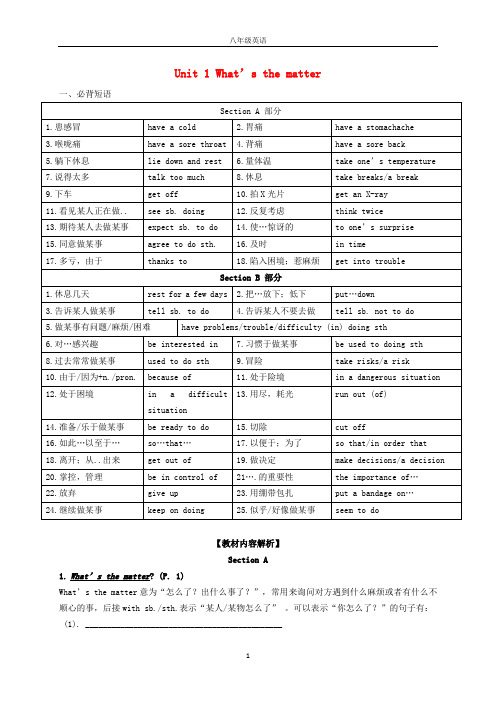
Unit 1 What’s the matter一、必背短语【教材内容解析】Section A1.What’s the matter? (P. 1)What’s the matter意为“怎么了?出什么事了?”,常用来询问对方遇到什么麻烦或者有什么不顺心的事,后接with sb./sth.表示“某人/某物怎么了”。
可以表示“你怎么了?”的句子有: (1). _____________________________________________(2). _____________________________________________(3)._____________________________________________(4). _____________________________________________(5). _____________________________________________(6). _____________________________________________2.I have a stomachache. (P. 1)stomachache用作名词,表示“胃疼、腹疼”,是一个复合名词,含有后缀ache的常见复合词还有:头痛 ______________;牙痛_________________;耳痛 ________________3.have a sore throat (P. 1)sore是形容词,意为“疼痛的,酸痛的”可作定语或表语。
常见短语:喉咙痛:_______________________后背痛:_______________________4.lie down and rest. (P. 2)(1). lie down意为“躺下”。
【拓展1】lie用作动词可以表示“躺”或者“位于”,还可以表示“撒谎”。
She is lying in bed with a bad cold. 英译汉_________________________________Beijing lies in the north of China. 英译汉__________________________________It is a bad habit to lie. 英译汉___________________________________________【拓展2】lie及lay一词多义(2). rest此处用作动词,表示“休息”,rest也可以用作名词,表示“休息”,常用的短语为“休息”:_______________________.例句:Let’s stop working and have a rest.5.Maybe you have a fever...(P. 2)maybe作副词,表示“可能、也许”,常常放在句首,相当于perhaps,可以与may be相互转换。
初二下册单元英语知识点:Unit1What’sthematter-

初二下册单元英语知识点:Unit1What’sthematter?初二下册单元英语知识点:Unit1hat’stheatter?Unit1hat’stheatter?一、基础知识hat’stheatter?怎么啦?出什么事情了?【解析】atter/'ætə)/n.问题;事情hat’stheatterithyou?=hat’sthetroubleithyou?=hat’srongithyou?你怎么了?【注】:atter和trouble为名词,其前可加the或形容词性物主代词,rong是ad不能加the【用法】用于询问某人有什么病或某人遇到什么麻烦、问题其后跟询问对象时,与介词ith 连用。
即:hat’stheatterithsb.?=hat’syourtrouble?=hat’sup?=hathappenstosb.?—hat’stheatterithyou?—Ihaveabadcold.2.Ihadacold.我感冒了。
haveacold=catchacold=havetheflu感冒haveafever发烧haveacough咳嗽haveastoachache胃疼,肚子疼haveatoothache牙疼haveaheadache头疼3.身体部位+ache 构成新的复合词stoach+ache=stoachachehead+ache=headachetooth+ache= toothachebac+ache=bacache后背痛4.uchtoo+形容词,意为太......,toouch+名词,意为很多,大量。
5.enough【形容、副词】足够的/地,enough放在名前后,形副后。
goodenough足够好,enoughoney=uchoney6.liedon躺下,lie躺,躺着,过去式lay;lie说谎,过去式lied7.aybe “或许”,常用于句首,表示可能性,后加句子。
人教版八年级下册英语Unit1 What’s the matter
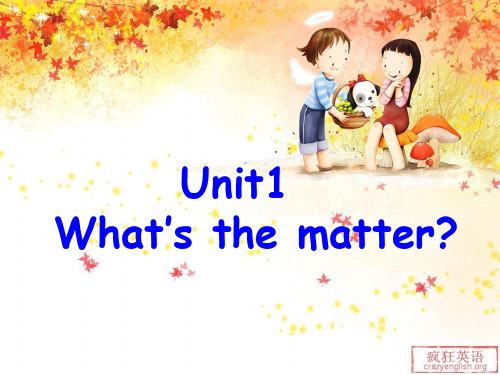
(2)主语+have/has+a+sore+发病部位
have a sore leg
have a sore foot
(3)主语+have/has+a+部位-ache
have a headache
have a toothache
(4)(There is)something wrong with +one’s+部位
lie down 躺下 rest/have a rest 休息
lie down and rest
A:What’s the matter? B: I have a stomachache. A: That’s too bad.You should lie down
and rest.And don’t eat anything for two hours. B:I guess I should.
have a toothache
牙痛
have a headache
头痛
have a sore back
背痛
have a sore throat
喉咙痛
What’s the matter with you ? =What’s the trouble with you? =What’s wrong with you?
honey n. 蜂蜜
drink hot tea with honey
A:What’s the matter? B: I have a sore throat. A: You should drink some hot tea
with honey. B:That sounds like a good idea.
八年级英语下册 Unit 1 What’s the matter短语、句子练习(新版)人教新目标版
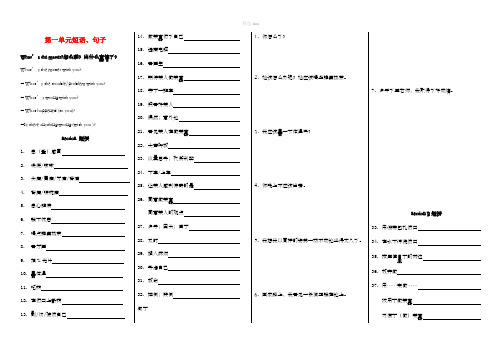
第一单元短语、句子What’ s the matter?怎么啦?出什么事情了?What’ s the matter with you?= What’s the trouble/problem with you?= What’ s wrong with you?= What happened (to you)?=Is there anything wrong (with you )?Section 短语1.患(重)感冒2.发烧/咳嗽3.头痛/胃痛/牙痛/背痛4.背痛/喉咙痛5.患心脏病6.躺下休息7.喝点蜂蜜热茶8.看牙医9.拍X光片10.量体温11.吃药12.在伤口上敷药13.割/切/擦伤自己14.做某事伤了自己15.远离电脑16.看医生17.期待某人做某事18.等下一班车19.照看好某人20.偶然;意外地21.看见某人在做某事22.大声呼救23.认真思考;权衡利弊24.下车/上车25.让某人感到惊奇的是26.同意做某事同意某人的观点27.多亏;因为;由于28.及时29.陷入麻烦30.考虑自己31.救命32.摔倒;跌倒句子1、你怎么了?2、她该怎么办呢?她应该喝些蜂蜜热茶。
3、我应该量一下体温吗?4、你晚上不应该出去。
5、我想我以同样的姿势一动不动地坐得太久了。
6、回家路上,我看见一条狗正躺在地上。
7、多亏了王老师,我取得了好成绩。
Section B短语33.用绷带包扎伤口34.在水下冲洗伤口35.按压住鼻子的两边36.放弃做37.用……来做……被用于做某事习惯于(做)某事38.让自己活得自在39.休息几天40.在烈日下41.感觉病了/感到不舒服42.划伤了膝盖43.流鼻血44.伤了背45.碰了头46.晒伤47.呼吸有问题48.被球打/碰了49.爬山(活动)50.去爬山51.对……有兴趣52.冒险53.失去生命54.因为55.亲自;独自56.(主语为物)耗尽;用光(主语为人)耗尽;用光57.准备做某事58.切掉他一半右臂59.失血太多60.左右为难;进退两难61.在困难的情况下62.摆脱;脱离63.学好英语的重要性64.做出好决定65.掌控一生66.坚持爬山67.活着还是死亡68.发生事故69.放弃做句子1、他在学习英语方面有困难。
2020春人教版八年级下册英语(浙江专版)习题:Unit 1 What is the matter? Period 2 Section A (2d-3c)

二、用括号内所给单词的正确形式填空 11. He can stay there for ten hours without _m__o_v_in_g__ (move).
12. My aunt was ill and had to ____g_o___ (go) to a doctor.
13. You shouldn't always think about_y_o_u_r_s_e_l_f (you).
ill.DT. hFeoroedathreatayoluotgroofwvyeoguertsaebllfeiss aalnwdayfrsufirtestho. choose from
E. If you have a large garden, growing your own is easy.
andF.tYheoyu ctaasntecodnetlriocliowuhsa.t_g_o_e_sA_o_n_a_n1d into the food you eat.
【点拨】根据表格第二栏中的原句: Trouble: He cooks plenty of dishes every day.可知答案。
3. What does Zhang Wei do? ___D____
A. A cook.
B. A teacher.
C. A policeman.
D. An engineer.
4. A car___h_i_t___ (撞击) the old man and he was badly hurt. 5. My sister is too young to look after _h__er_s_e_l_f _ (她自己). 6. My brother fell off the bike and___h_u_r_t__(受伤) himself. 7. We need to have a __b_r_e_a_k__ (间歇) after 3 hours' work.
八级英语下册UnitWhat'sthematter全单元教案新版人教新目标版

Unit 1 What's the matter年级八学科英语课型新授课时间主备人八年级英语组教学课题Unit 1 What’s the matter?Section A (1a~2d)课时 1教学目标1. 学习用英语表达身体各部位的名称及如何谈论身体健康状况。
2. 培养学生能运用所学语言简单地描述自己的健康状况及如何询问对方的身体健康状况。
3. 通过学习课文内容,养成健康的生活方式。
4. 教育学生学会关心他人,通过询问他人的健康情况并能给予帮助,增进人与人之间的感情。
重点难点教学重点:1.掌握情态动词should / shouldn’t.的用法.2.学习have的用法.教学难点:学会提供帮助的基本句型教学准备PPT教学过程1、新课导入:Step1: Can you name the parts of the body?让学生用英语所处器官名称。
Step2:Follow me:(让学生站起来完成韵律操)Everybody moves your bodyNod your head and touch your faceTouch your nose and close your eyesTouch your ears and clap your handsRaise your arms and look at your backTouch your stomach and tap your footSit down and move your legs2、设问导读:二次备课4. 如果你的头和脖子明天仍然疼的话,请去看医生。
五.拓展探究Homework: Make up a conversation between a doctor and a patient.课堂小结本课通过身体器官韵律操导入课时内容,激发学生的学习兴趣,提高课堂教学的效率,同时针对学生日常生活中的常见症状,让学生在列举过程中掌握患病方式的三种表达方式。
八年级下册unit1-what's-the-matter课文重难点讲解

八年级英语下册目录课文重难点讲解Unit1 What’s the matter?Unit2 I’ll help to clean up the city parks.Unit3 Could you please clean your room?Unit4 Why don’t you talk to your parents?Units 5 What were you doing when the rainstorm came? Unit 6 An old man tried to move the mountains.Unit 7 What’s the highest mountain in the world?Unit8 Have you read Treasure Island yet?Unit 9 Have you ever been to a museum?Unit10 I’ve had this bike for three years.Unit1 What’s the matter?Section A1. What’ s the matter? 怎么啦?出什么事情了?【解析】matter/ ' mætə(r)) /n.问题;事情What’ s the matter with you?= What’s the trouble with you?= What’ s wrong with you?你怎么了?【注】:matter 和trouble 为名词,其前可加the 或形容词性物主代词,wrong 是adj. 不能加the【2013自贡3】18. —What’s the matter ______ Tom. He is wet through.—His car ran _______ the river.A.with; inB.to; intoC.with; into【用法】用于询问某人有什么病或某人遇到什么麻烦、问题其后跟询问对象时,与介词with连用。
八年级英语(下册)Unit1 What’s the matter单元语言点讲解和训练

一.短语归纳1.too much 太多2.lie down 躺下3.get an X-ray 做个X光检查4.take one ’s temperature 量体温5.put some medicine on ......在....上敷药5.have a fever 发烧7.take breaks /take a break 休息8.without thinking twice 没多想9.get off 下车9.take sb to the hospital 送某人去医院11.wait for等待12.to one’s surprise 使.......惊讶的13.thanks to多亏于;由于14. in time及时15.think about 考虑16.have a heart problem患有心脏病17.get into the trouble 遇到麻烦18.do the right thing做正确的事情事情19.fall down 摔倒20.put ...... on sth把...放在某物上21.get hit/sunburned 摔伤/烧伤22.be interested in 对.....感兴趣23.be used to 习惯于....24.take risks/take a risk 挑战25.lose one’s life 失去生命26.because of 因为27.run out of 用完28.cut off 切除29.get out of 从...出来30.make a decision/decisions 做决定31.be in control of 掌管;管理32.give up 放弃㈡用法归纳:1.need to do sth .需要去做某事2.see sb doing sth 看见某人正在做某事3.ask sb sth 询问某人某事4.expect sb to do sth 期望某人做某事5.agree to do sth 同意做某事6.help sb (to) do sth 帮助某人做某事7.want to do sth 想要做某事 8.tell sb to do sth 告诉某人做某事9.have problems(in) doing sth 做某事有困难 e sth to do sth用某物去做某事11.be/get used to doing sth 习惯于做某事12.seem to do sth 好像做某事13.keep on doing sth 继续做某事14.mind doing sth 介意做某事㈢语法点:1.询问某人的健康问题及遇到麻烦的表达方法。
八年级英语下册 Unit 1 What’s the matter知识点总结、作文 (新版)人教新目标
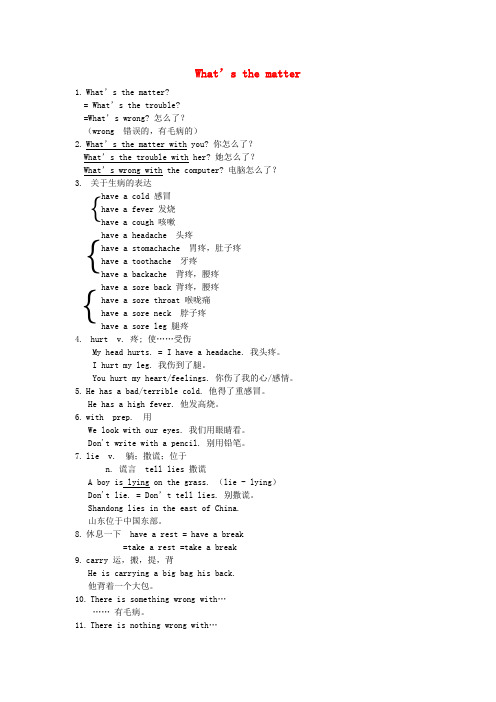
What’s the matter1.What’s the matter?= What’s the trouble?=What’s wrong? 怎么了?(wrong 错误的,有毛病的)2.What’s the matter with you? 你怎么了?What’s the trouble with her? 她怎么了?What’s wrong with the computer? 电脑怎么了?感冒发烧咳嗽头疼胃疼,肚子疼牙疼背疼,腰疼背疼,腰疼喉咙痛脖子疼腿疼疼; 使……受伤My head hurts. = I have a headache. 我头疼。
I hurt my leg. 我伤到了腿。
You hurt my heart/feelings. 你伤了我的心/感情。
5.He has a bad/terrible cold. 他得了重感冒。
He has a high fever. 他发高烧。
6.with prep. 用We look with our eyes. 我们用眼睛看。
Don't write with a pencil. 别用铅笔。
7.lie v. 躺;撒谎;位于n. 谎言 tell lies 撒谎A boy is lying on the grass. (lie - lying)Don't lie. = Don’t tell lies. 别撒谎。
Shandong lies in the east of China.山东位于中国东部。
8.休息一下 have a rest = have a break=take a rest =take a break9.carry 运,搬,提,背He is carrying a big bag his back.他背着一个大包。
10.There is something wrong with………有毛病。
11.There is nothing wrong with………没毛病。
Unit1what’sthematter_SectionA知识点梳理人教版八年级英语下册

人教版八年级下册英语课本知识点梳理Unit 1 wh at’s the matter? sectionA课文内容:What's the matter? 怎么了? (教材第1页)【用法详解】What's the matter? 怎么了?/出什么事了?常用于询问某人患了何种疾病,遇到了什么困难等,也可用于询问某物出了什么故障,其后可接with sb./sth.,表示“某人/某物怎么了?”。
其中matter 用作名词,意为“问题;事情”matter前须加定冠词the。
【例句】What's the matter? 怎么了?Bad luck.I lost my pen. 真倒霉,我弄丢了钢笔.What's the matter with him? 他怎么了?He has a sore back.他背痛【拓展】matter[动词] 要紧;有关系多用在否定句、疑问句或条件句中It doesn't matter.没关系。
(通常用来回答对方的道歉)I have a cold. 我感冒了。
(教材第1页)【用法详解】have a cold (患)感冒。
其中have 用作及物动词,意为“患(病);遭受(病痛)”,常用于结构“have a/an +疾病名称”表示患病或身体某部位不舒服。
此时它不能用于进行时态,其第三人称单数形式为has,过去式为had。
常见的表示病痛的短语还有:have a fever 发烧have a toothache 牙疼have a headache头痛have a cough 咳嗽have a stomachache胃痛Do you often have a cold? 你经常感冒吗?Jim had a stomachache after supper yesterday.吉姆昨天晚饭后胃痛。
l have a stomachache.我胃痛。
( 教材第1 页)【用法详解】stomachache [名词]胃痛;腹痛是由“名词stomach(;腹部)+ache(疼痛)”构成的复合名词。
2020年春人教新目标英语八年级下册unit1重点知识点分析与练习(无答案)
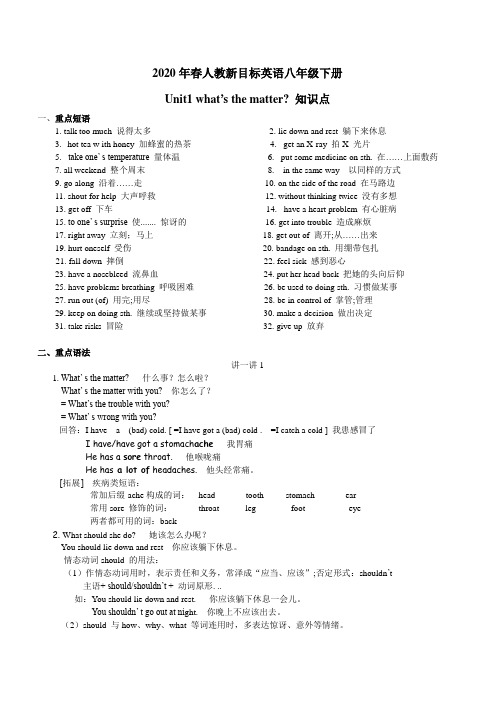
2020年春人教新目标英语八年级下册Unit1 what’s the matter? 知识点一、重点短语1. talk too much 说得太多2. lie down and rest 躺下来休息3.hot tea w ith honey 加蜂蜜的热茶4.get an X-ray 拍X 光片5.take one’ s temperature 量体温6.put some medicine on sth. 在……上面敷药7. all weekend 整个周末8. in the same way 以同样的方式9. go along 沿着……走10. on the side of the road 在马路边11. shout for help 大声呼救12. without thinking twice 没有多想13. get off 下车14.have a heart problem 有心脏病15.to one’ s surprise 使....... 惊讶的16. get into trouble 造成麻烦17. right away 立刻;马上18. get out of 离开;从……出来19. hurt oneself 受伤20. bandage on sth. 用绷带包扎21. fall down 摔倒22. feel sick 感到恶心23. have a nosebleed 流鼻血24. put her head back 把她的头向后仰25. have problems breathing 呼吸困难26. be used to doing sth. 习惯做某事27. run out (of) 用完;用尽28. be in control of 掌管;管理29. keep on doing sth. 继续或坚持做某事30. make a decision 做出决定31. take risks 冒险32. give up 放弃二、重点语法讲一讲11. What’ s the matter? 什么事?怎么啦?What’ s the matter with you?你怎么了?= What’s the trouble with you?= What’ s wrong with you?回答:I have a (bad) cold. [ =I have got a (bad) cold . =I catch a cold ] 我患感冒了I have/have got a stomach ache 我胃痛He has a sore throat. 他喉咙痛He has a lot of headaches. 他头经常痛。
英语人教版八年级下册第一单元What’s-the-matter
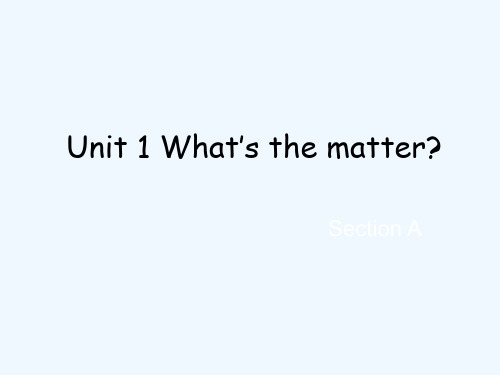
A: What’s the matter? B: I’m not feeling well.
I have a fever. A: When did it start? B: About two days ago. A: Oh, that’s too bad.
Unit 1 What’s the matter?
Section A
body
Name each part of the body
arm
ear
eye foot
leg hand
mouth
nose
tooth
neck
Follow me:
• Everybody moves your body • Nod your head and touch your face • Touch your nose and close your eyes • Touch your ears and clap your hands • Raise your arms and look at your back • Touch your stomach and tap your foot • Sit down and move your legs
What should she do? She should take some medicine.
What’s the matter with you? I have a toothache. You should see a dentist. That’s a good idea.
What’s the matter with her? She has a sore throat. What should she do?
2020-新人教版八年级英语下册单词表(含音标)

Unit 1 What’s the matter? Array matter [ˈmætə] v. 重要;要紧;有关系What’s the matter? 怎么了?出什么事了?sore [sɔ:(r)] adj. 疼痛的;酸痛的have a cold 感冒stomachache ['stʌməkeɪk] n. 胃痛;腹痛have a stomachache 胃痛foot(复数feet) [fu:t] n. 脚neck [nek] n. 颈;脖子stomach ['stʌmək] n. 胃;腹部throat [θrəʊt] n. 喉咙fever ['fi:və] n. 发烧;发热lie [laɪ] v. 躺;平躺lie down 躺下rest [rest] n. 剩余部分;其余;放松;休息cough [kɒf] n. & v. 咳嗽X-ray ['eksreɪ] n. X光;X射线toothache [ˈtu:θeɪk] n. 牙痛take one's temperature 量体温headache [ˈhedeɪk] n. 头痛have a fever 发烧break [breɪk] n. & v. 休息;暂停;打破take breaks (take a break)休息hurt [hə:t] v. 伤害;损害;使受伤passenger ['pæsɪndʒə] n. 乘客;旅客off [ɒf] adv. prep. 离开(某处);从…去掉get off 下车to one's surprise 使…惊讶;出乎…意料onto [ˈɒntə] prep. 向;朝trouble [ˈtrʌbl] n. 麻烦;烦扰;问题hit [hit] n. & v. 碰撞;打;打击right away 立即;马上get into 陷入;参与herself [hə:ˈself] pron. 她自己;她本身(she的反身代词)bandage ['bændɪdʒ] n. & v. 绷带;用绷带包扎sick [sɪk] adj. 患病的;不适的knee [ni:] n. 膝盖nosebleed [ˈnəʊzbli:d] n. 鼻出血breathe [bri:ð] v. 呼吸sunburned [ˈsʌnbɜ:nd] adj. 晒伤的ourselves [ɑ:ˈselvz] pron.我们自己(we的反身代词)climber [ˈklaɪmə(r)] n. 登山者try out 参加…选拔;试用journey ['dʒɜ:nɪ] n.(尤指长途)旅行;行程raise [reɪz] v. 抬起;举起;筹集;征集midnight n. 子夜;午夜alone [əˈləun] adv. 独自地;孤独地repair [riˈpɛə] v. 修理;修补fix [fiks] v. 修理;安装fix up 修理;修补give away 赠送;捐赠take after (外貌或行为)像broken ['brəʊkən] adj. 破损的;残缺的wheel [wi:l] n. & v. 轮子;车轮;旋转letter [ˈletə] n. 信件;字母Miss [mɪs] n. 小姐set up 建立;设立disabled [disˈeibəld] adj.有残疾的;丧失能力的make a difference 影响;有作用blind [blaɪnd] adj. 盲的;盲目的;失明的deaf [def] adj. 聋的imagine [ɪˈmædʒɪn] v. 想象;设想difficulty ['dɪfɪkəltɪ] n. 困难open [ˈəʊpən] v. 打开door [dɔ:] n. 门carry ['kærɪ] v. 携带;搬运train [treɪn] v. 训练;培养excited [ɪkˈsaɪtɪd] adj. 激动的;兴奋的tr aining [ˈtreɪnɪŋ] n. 训练;培训kindness [ˈkaɪndnəs] n.仁慈;善良;亲切;善意clever [ˈklevə] adj. 聪明的;机灵的understand [ˌʌndəˈstænd] v. 懂;理解change [tʃeɪndʒ] n. & v. 改变interest ['ɪntrəst] n. & v. 感兴趣;兴趣sir [sɜ:(r)] n. 先生madam ['mædəm] n. 夫人;女士allow [əˈlaʊ] v. 允许;准许wrong [rɔŋ] adj. 错误的What's wrong? 哪儿不舒服?look through 浏览;快速查看guess [ɡes] v. 猜测;估计deal [di:l] v. 处理;应付big deal 重要的事work out 成功地发展;解决get on with 和睦相处;关系良好relation [rɪˈleɪʃn] n. 关系;联系;交往communication [kəˌmju:nɪˈkeɪʃn] n.交流;沟通argue [ˈɑ:ɡju:] v. 争论;争吵cloud [klaʊd] n. 云elder ['eldə(r)] adj. 年级较长的instead [ɪnˈsted] adv. 代替whatever [wɒtˈevər] pron.任何,不管什么,无论什么nervous [ˈnə:vəs] adj. 紧张不安的offer ['a:fər] v. 提供;自愿给予proper [ˈp rɔpə] adj. 合适的;适当的secondly [ˈsekəndli] adv. 第二;其次communicate [kəˈmju:nikeit] v.沟通,通信,通讯explain [ɪkˈspleɪn] v. 讲解;解释;说明clear [klɪə] adj. 清晰的;清楚易懂的copy [ˈkɔpi] v. 复制return [rɪ'tɜ:n] v. 回来;返回;归还anymore ['enɪmɔ:] adv. 不再;再也不member [ˈmembə] n. 成员;会员pressure ['preʃə(r)] n. 压力compete [kəm'pi:t] v. 比赛;竞争opinion [əˈpɪnjən] n. 意见;想法;看法skill [skɪl] n. 技能;技巧typical [ˈtɪpɪkl] adj. 典型的football [ˈfʊtbɔ:l] n. 足球cut out 删去;删除quick [kwɪk] adj. 快的;迅速的continue [kənˈtɪnju:] v. 继续;连续compare [kəm'peə] v. 比较compare…with 比较;对比completely [kəmˈpli:tli] adv. 彻底地;完全地shocked [ʃɔkt] adj. 震惊的;震撼的silence [ˈsaɪləns] n. 寂静;沉默in silence 沉默;无声recently [ˈri:sntli] adv. 不久前;近来;最近take down 拆除;往下拽;记录terrorist [ˈterərɪst] n. 恐怖分子date [deɪt] n. 日期;日子tower [ˈtaʊə(r)] n. 塔at first 首先;最初truth [tru:θ] n. 真相;真理;事实Allen [ˈælən] 艾伦(姓)Martin Luther King [ˈmɑːtɪn ˈluːθə kɪŋ] 马丁.路德.Alabama [ˌæləˈbæmə] 阿拉巴马Animal Helperline [ˈænɪml ˈhelplaɪn] 动物保护热线World Trade [treid] Center 世界贸易中心Unit 6 An old man tried to move the mountains.shoot [ʃu:t] v. 投篮;射击;发射stone [ˈstəʊn] n. 石头weak [wi:k] adj. 虚弱的;柔弱的god [ɡɒd] n. 上帝;神remind [rɪˈmaɪnd] v. 提醒;使想起bit [bɪt] n. 一点;小块a little bit 有点儿;稍微silly [ˈsɪlɪ] adj. & n. 愚昧的;傻子;蠢货instead of 代替;反而turn into 变成object [ˈɒbdʒɪkt] n. 物体;目标;物品hide [haɪd] v. 躲藏;隐藏tail [teil] n. 尾巴magic [ˈmædʒɪk] n. 魔法;巫术stick [stɪk] n. & v. 棍;棒;刺;戳;插excite [ɪk'saɪt] v. 使激动;使兴奋Western ['westən] adj. 西方的;欧美的once upon 从前stepsister [ˈstepsɪstə(r)] n. 继姐(妹)prince [prɪns] n. 王子fall in love 爱上;喜欢上fit [fɪt] v. 适合;合身couple ['kʌpl] n. (尤指)夫妻;两人smile [smaɪl] n.& v. 微笑marry [ˈmæri] v. 与某人结婚get married 结婚gold [ɡəʊld] n. 黄金;金币include [ɪnˈklu:d] v. 包括;包含freezing [ˈfri:zɪŋ] adj. 极冷的;冷冻的condition [kənˈdɪʃn] n. 条件;状况take in 吸入;吞入succeed [səkˈsi:d] v. 成功;实现目标challenge [ˈtʃælɪndʒɪŋ] n.& v. 挑战;考验in the face of 面对(问题;困难)achieve [əˈtʃi:v] v. 完成;实现force [fɔ:s] n. 力;力量nature ['neɪtʃə(r)] n. 自然界;大自然even though(=even if)即使;虽然ocean ['əʊʃn] n. 海洋the Pacific Ocean 太平洋cm(=centimeter) [ˈsentɪˌmi:tə] n. 厘米weigh [wei] v. 称…重量birth [bɜ:θ] n. 出生;诞生at birth 出生时up to 到达(某数量;程度);不多于adult [ˈædʌlt],[əˈdʌlt] n. 成年人bamboo [bæmˈbu:] n. 竹子endangered [ɪnˈdeɪndʒəd] adj.research [rɪˈsɜ:tʃ] n.& v. 研究;调查keeper [ˈki:pə(r)] n. 饲养员;保管人awake [əˈweɪk] adj. 醒着excitement [ɪkˈsaɪtmənt] n. 激动;兴奋walk into 走路时撞到fall over 绊倒or so 大约illness [ˈɪlnəs] n. 疾病;生病wild [waɪld] adj. 野性的;野生的gove rnment [ˈgʌvənmənt] n. 政府whale [weɪl] n. 鲸oil [ɔɪl] 油;食用油;石油protection [prəˈtekʃn] n. 保护;保卫huge [hju:dʒ] adj. 巨大的;极多的Tenzing Norgay 丹增.诺尔盖Edmund Hillary 埃德蒙希拉里Junko Tabei 田部井淳子Qomolangma 珠穆朗玛峰the Nile 尼罗河the Caspian 里海(世界上最大的咸水湖)the Sahara 撒哈拉沙漠the Yangtse 长江the Yellow River 黄河beauty [ˈbju:ti] n. 美丽;美好的事物million [ˈmiljən] num. 百万record ['rekɔ:d] n. & v. 记录;唱片;录制;录音introduce [ˌɪntrəˈdju:s] v. 介绍;传入;引进line [lain] n. 排;队;列Alex ['æleks] n. 亚历克斯;Garth [gɑːθ] Brooks [bruks] 加思.布鲁克斯T he Beatles [ˈbi:tlz] 披头士T reasure [ˈtreʒə(r)] Island 金银岛Alice in Wonderland[ˈwʌndəlænd] 爱丽丝梦游仙境Little Women[ˈwɪmɪn] 小妇人O liver [ˈɔlivə] Twist [twɪst] 雾都孤儿Robinson Crusoe[ˈkru:səu] 鲁滨逊漂流记T om Sawyer [ˈsɔːjə] 汤姆索亚历险记H arry [ˈhæri] Potter[ˈpɒtə(r)] 哈利波特N ashville[ˈnæʃvil] 纳什维尔(美国田纳西州首府)T ennessee [ˌtenəˈsi:] 田纳西州(美国)Country Music Hall of Fame [feim] and Museum乡村音乐名人堂与博物馆Unit 9 Have you ever been to a museum?amusement [ˌəˈmju:zmənt] n. 娱乐;消遣;游戏amusement park 游乐场somewhere [ˈsʌmweə] adv. 某处;在某处camera [ˈkæmərə] n. 照相机invention [ɪnˈvenʃn] n. 发明;创造invent [inˈvent] v. 发明;创造unbelievable [ˌʌnbɪˈli:vəbl] adj. 难以置信的,progress [ˈprəʊɡres] n. 进步;进展rapid [ˈræpɪd] adj. 迅速的;快速的unusual [ˌʌnˈju:ʒuəl] adj. 特别的;不寻常的toilet [ˈtɔɪlət] n. 坐便器;厕所encourage [inˈkʌridʒ] v. 鼓励;激励social [ˈsəuʃəl] adj. 社会的peaceful [ˈpi:sful] adj. 和平的;平静的tea art 茶艺performance [pəˈfɔ:məns] n. 表演;演出perfect [ˈpɜ:fɪkt] adj. 完美的;理想的;完全的tea set 茶具itself [ɪtˈself] pron. 它自己;它本身collect [kəˈlekt] v. 收集a couple of 一对;两个;几个German [ˈdʒɜ:mən] n. & adj. 德语;德国人(的)memory [ˈmemərɪ] n. 记忆;记忆力;回忆cent [sent] n. 分;分币toy [tɔɪ] n. 玩具bear [bɛə] n. 熊maker [ˈmeɪkə(r)] n. 生产者;制造者bread maker 面包机scarf [skɑ:f] n. 围巾;披巾;头巾soft [sɔft] adj. 柔软的soft toy 软体玩具;布绒玩具check [tʃek] n. & v. 餐馆账单;检查check out 察看;观察board [bɔ:d] n. 板子;甲板board game 棋类游戏junior [ˈdʒu:nɪə(r)] adj. 地位低下的junior high school 初中clear [klɪə] adj. 清晰的;清澈的clear out 清理;清除掉bedroom [ˈbedru:m] n. 卧室no longer 不再;不复own [əun] adj. 属于自己的railway [ˈreɪlweɪ] n. 铁路;铁道part [pɑ:t] n. 部分;零部件part with 放弃;交出certain [ˈsə:tn] adj. 某一;确定的;无疑的as for 至于;关于honest [ˈɒnɪst] adj. 诚实的;正直的to be honest 说实在的while [wail] conj. 当...时候;一段时间;一会儿truthful [ˈtru:θfl] adj. 诚实的;真实的hometown [ˈhəʊmtaʊn] n. 家乡;故乡nowadays [ˈnaʊədeɪz] adv. 现今;现在;目前search [sɜ:tʃ] v. 搜索;搜查among [əˈmʌŋ] prep. 在其中…之一crayon ['kreɪən] n. 彩色铅笔shame [ʃeɪm] n. 羞耻regard [rɪ'ɡɑ:d] n. & v. 致敬;问候;将…视为count [kaunt] n. & v. 计算;计数;有价值century ['sentʃərɪ] n. 世纪;百年according [ə'kɔ:dɪŋ] adv. 依照;按照opposite [ˈɔpəzit] prep. &adj. 在…对面;与…相对;对面的especially [ɪˈspeʃəli] adv. 特别;尤其childhood [ˈtʃaɪldhʊd] n. 孩童时期consider [kənˈsidə] v. 仔细考虑;思考;注视;close to 几乎;接近hold [həuld] v. 拥有;抓住。
人教版八年级英语下册 Unit1 What's the matter单词讲解
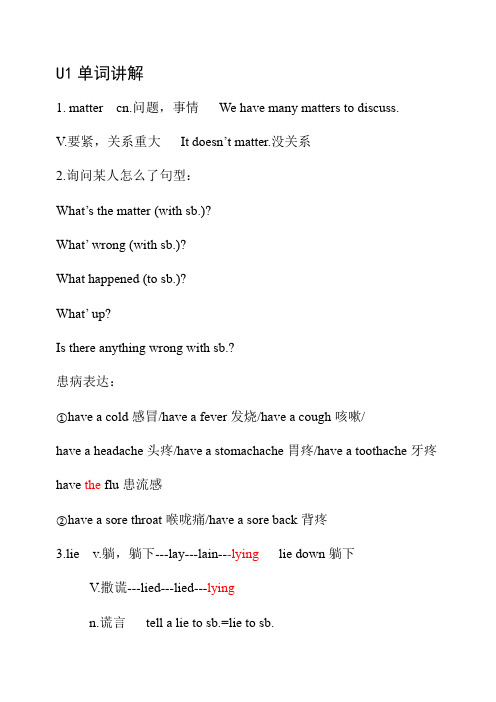
U1单词讲解1.matter cn.问题,事情We have many matters to discuss.V.要紧,关系重大It doesn’t matter.没关系2.询问某人怎么了句型:What’s the matter (with sb.)?What’ wrong (with sb.)?What happened (to sb.)?What’ up?Is there anything wrong with sb.?患病表达:①have a cold感冒/have a fever发烧/have a cough咳嗽/have a headache头疼/have a stomachache胃疼/have a toothache牙疼have the flu患流感②have a sore throat喉咙痛/have a sore back背疼3.lie v.躺,躺下---lay---lain---lying lie down躺下V.撒谎---lied---lied---lyingn.谎言tell a lie to sb.=lie to sb.4.rest n.休息&v.休息rest=have a restadj.剩余的the rest of...5.break n.休息take a break=take breaksv.①打破break the window ②违背break the law/rulebreak up打碎break down出故障break out爆发break into闯入6.get off下车---get on上车(空间大:bus)get in上车----get out of下车(空间小:car)7.trouble n.问题,苦恼have trouble/difficulty/problems(in) doing sth.eg:I have trouble in learning English.get into trouble陷入麻烦get out of trouble摆脱麻烦V.麻烦trouble sb. to do sth.麻烦某人做某事8.right away立即,马上=at once=right now=immediately9.sick adj.生病的,有病的be sick=be ill 但是ill只能做表语adj.恶心的,厌倦的feel sick感到恶心10.b reathe v.呼吸---breath n.呼吸take a deep breath深呼吸11.b e used to doing习惯于做某事used to do过去常常做某事be used to do被用来做某事eg:I used to drive to work,but now I am used to taking a bus.12.r isk v.冒险risk doing冒险做某事n.风险,危险take a risk=take risks13.accident n.事故----accidental adj.意外的---accidently adv.意外地14.sb. run out of sth.用完,用尽sth. run out15.cut---cut---cut---cuttingcut off切除cut up切碎cut down砍倒,减少cut out删除,剪下cut in插嘴16.m ean---meant---meantmean to do打算做某事mean doing意味着做某事meaning n.意思What’s the meaning of...?=What does ... mean?=What do you mean by...?meaningful adj.有意义的---meaningfully adv.meaningless adj.无意义的---meaninglessly adv.17.i mportant n.重要性---important adj.重要的the importance of... ...的重要性18.d ecision n.决定---decide v.决定decide to do=make a decision to do19.c ontrol控制,管理---controlled---controlledbe in control在控制下be out of control失去控制20.d eath n.死,死亡---die v.死---dead adj.死了的---dying adj.垂死的eg:The dog’s death makes me sad.The dog died 3 days ago.The dog was dead when I found it.21.g ive up放弃give up doing give it/them upgive away捐赠give out分发give off发出(光、热等)give in屈服。
- 1、下载文档前请自行甄别文档内容的完整性,平台不提供额外的编辑、内容补充、找答案等附加服务。
- 2、"仅部分预览"的文档,不可在线预览部分如存在完整性等问题,可反馈申请退款(可完整预览的文档不适用该条件!)。
- 3、如文档侵犯您的权益,请联系客服反馈,我们会尽快为您处理(人工客服工作时间:9:00-18:30)。
Unit 1 What’s the matter
SectionB (1a—1d)
Ⅰ.用所给单词的适当形式填空
1.The doctor told Jack to take some ________ (medicine) after each meal. 2.We can hear a few ________(bird) singing in the tall tree.
3.—What happened to you yesterday?
—I ________(feel) sick and had to see a doctor.
4.My cousin, Harry________(fall) down and ________(cut) his knees last week. 5.________(press) the doorbell before going into the room.
Ⅱ.句型转换
1.Put some medicine on the cut.(改为否定句)
________ ________ ________ medicine on the cut.
2.You should put on a clean Tshirt.(改为祈使句)
________ ________ a clean Tshirt.
3.Can you put the bandage on the cut?(改为同义句)
________ ________ ________ yourself?
4.Mary had__a__fever two days ago.(对画线部分提问)
________ ________ ________ Mary two days ago?
5.Yesterday my teeth were sore after I ate the chocolate.(改为同义句) Yesterday I ________ ________ ________ after ________ the chocolate.
Ⅲ.单项填空
( )1.If you cut your finger by accident, please run it ________ water. A.on B.under C.in D.of
( )2.Don't worry. We still have ________ minutes left.
A.a little B.little
C.a few D.few
( )3.—What are you going to do this weekend?
—We are going to visit ________ children in hospital.
A.ill B.sick C.happy D.angry
( )4.—What happened to Jim?
—He got hit ________ head.
A.in the B.in a C.on the D.on a
( )5.—________?
—I cut myself just now.
A.What's the wrong
B.What happened
C.What do you do
D.Where did you cut yourself
Ⅳ.阅读理解
A cold is a common illness(疾病). It often starts with a sore throat. And you usually have a headache, too. It's not serious,but you can feel very bad.
What should you do when you have a cold?You should have a good rest first. It's good to drink a lot of water,too. You can see a doctor and take some medicine. Maybe you can also try some Chinese medicine that is now very popular around the world.
What should you do to stop a cold?One important way is to exercise more often. Running,swimming or even walking can help a lot. Try to exercise for at least 30 minutes a day. It's also important to go to bed and get up early. Studies show that the cold or flu virus (流感病毒) can live on our hands for a long time. So you should often wash your hands with soap. Finally, it's important to have a balanced diet(均衡饮食).
If you can do these, you will hardly ever catch a cold again.
( )1.What should you do when you have a cold?
A.Go to a doctor.
B.Sleep early and get up late.
C.Exercise more often.
D.Drink much cold water.
( )2.Why should you often wash your hands with soap?
A.Because it makes our hands smell good.
B.Because it makes our hands nicer.
C.Because it may help keep the flu virus away.
D.Because it is not expensive for us to buy soap.
( )3.What can we know from the passage?
A.Only Chinese medicine can help stop a cold.
B.We should run or swim when we have a cold.
C.The most important way to stop a cold is to drink lots of water.
D.Good eating habits and much exercise can help us stay away from a cold.
教师详解详析
Ⅰ.1.medicine 2.birds 3.felt
4.fell; cut 5.Press
Ⅱ.1.Don't put any 2.Put on
3.Can you bandage 4.What happened to
5.had a toothache; eating
Ⅲ.1.B
2.C a little 意为“一点儿”,修饰不可数名词;little意为“几乎没有”,修饰不可数名词;a few意为“有些;几个”,修饰可数名词复数;few意为“几乎没有”,修饰可数名词复数。
minutes为可数名词复数,且由句意可知表示肯定含义。
故选C。
3.B ill和sick的意思相同,都表示“生病的,有病的”。
但ill只能作表语,构成“be/fall ill”短语;sick不仅可以放在名词前面作定语,也可以放在系动词后面作表语。
根据句意可知选B。
4.C get hit on the head意为“被击中头部”,这里get hit相当于be hit; “get hit on/in the+身体部位”表示“身体某个部位受伤”,用in表示受伤部位较软;用on表示受伤部位较硬。
5.B
Ⅳ.1.A
2.C 根据第三段中“Studies show that the cold or flu virus can live on our hands for a long time. So you should ofte n wash your hands with soap.”可知,感冒或者流感病毒会长时间停留在手上,用肥皂洗手有助于让病毒远离。
3.D。
